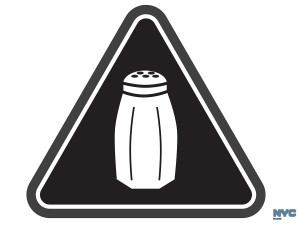New York City begins new era in nutritional warnings

By Dr. Sushma Sharma, Director of Public and Population Health Research, DFWHC Foundation
Starting today, New York City officially became the first U.S. city to successfully enforce chain restaurants to add a warning icon next to high-sodium items on menus. The New York City Board of Health voted unanimously September 9 to be the first city to make sure chains put salt shaker symbols next to the food to highlight dishes with more than the recommended daily limit of 2,300 mg of sodium, or approximately one teaspoon.
This is the new symbol:

Signs at registers will define the icon with “indicates sodium (salt) content of this item is higher than the total daily recommended limit (2300 mg). High sodium intake can increase blood pressure and risk of heart disease and stroke.”
Chains with more than 15 locations nationwide — which currently accounts for one-third of New York City’s restaurant traffic — will be subject to the city rule. This is another important initiative along with the calorie labeling rule which was implemented in New York in 2008.
“Along with sodium being directly linked to raising blood pressure, there is credible information that it can damage the inner lining of the blood vessel, damage the kidney, the small vessels of the eye and the small vessels of the brain,” said Dr. Howard Weintraub of NYU Langone Medical Center.
Rebecca Blake, senior director of clinical nutrition at Mount Sinai Beth Israel, says consumers need information about how to lower sodium intake. “We owe it to the consumers to explain what a chronically high sodium diet may lead to, especially in combination with obesity.”
Dr. Mary T. Bassett, the city’s health commissioner, said in September that she hoped other cities would adopt similar rules in an effort to combat heart disease, which she noted is “the leading cause of death in the U.S.”
Heart disease is the No. 1 cause of death for Texas residents. The average American takes in about 3,400 mg of salt daily, with only about one in 10 in the U.S. adhering to the one teaspoon measurement, according to the AP.
The DFW Hospital Council Foundation would like to congratulate everyone in New York for supporting this initiative and starting a new era of “Nutritional Warnings.”
